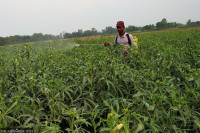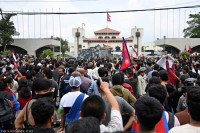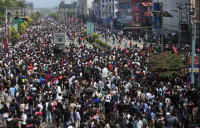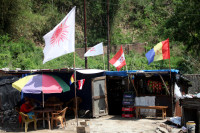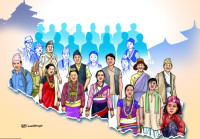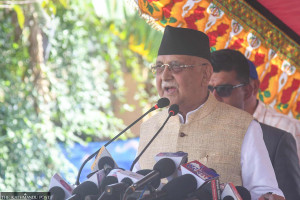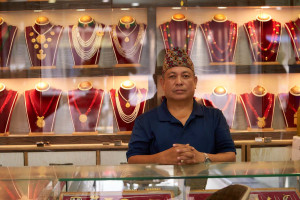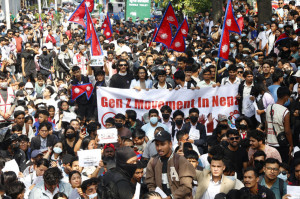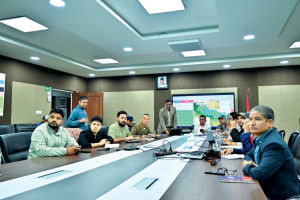Opinion
The next frontier
People need to be at the centre of development plans for them to be a success
Purna Bahadur Thapa & Santosh Gautam
Since the 1950s, Nepal has been continuously receiving foreign aid for development. Over the years, many policies, strategies, and programmes have been developed by Nepal with and without the assistance of donors. If we match the foreign aid received by the country and the pace of development, the results are daunting. Even as many policies have been formulated and programmes implemented, they have mostly failed to address the needs of the people and the country’s priorities, owing to the lack of meaningful participation of the right stakeholders, wrong prioritisation of agendas, and blind adherence to international targets.
Time for reflection
Currently, the world is on its way to launch the post-2015 sustainable development goals of the UN, which propose to end poverty by 2030. However, do we not need a micro-level, in-depth analysis of developmental interventions? Have the lives of the marginalised and needy people really changed with the increase in the figures of the Millennium Development Goals (MDGs)? Unless these questions are answered, the post-2015 agenda will also depict our success in figures and failure in reality.
Furthermore, in the name of ‘technical assistance’, donors come from overseas with a blueprint of policies and impose the same in aid-receiving countries. Most donor agencies do not accept the priorities of the recipient government, resulting in less
pro-poor development interventions.Policymaking by donors and elites for the poor and deprived is done in the absence of a mechanism to ensure the participation of the beneficiaries in the policy-making process. People are still ‘others’, for whom developmental activities are to be carried out. All of this makes it seem as though development agencies are creating another soft-colony in underdeveloped and developing countries.
Rhetoric and reality
The thirteenth plan (Fiscal Year 2014-2016) has set the target of promoting Nepal from an underdeveloped country to a developing country by 2022. But political instability, weak governance, lack of ownership of development, and corruption are huge stumbling blocks to meeting that target.
Though the UN has envisioned support to member states for meeting the post-2015 development agenda, Nepal’s commitment to the cause remains weak. As the UN document is only a framework or a vision for development, concerned member states need to hold ample discussions, be prepared, and plan strategically to translate them into reality. So even though much has been written in policy and programme documents, most have not translated into action. In addition, development has seldom been the priority of our public discourse, amidst much debate on politics. So the current state of affairs can be largely blamed on politics devoid of developmental priorities.
This also raises a host of concerns and questions about our development efforts. To begin with, are government policies accountable to the Nepali people or do they only serve donor interests? Similarly, who initiates the national policy dialogue? Do our policy documents reflect the local people’s understanding of development?
The truth is, the arguments, opinions, and thoughts of locals are largely not taken into account while formulating development policies. As a result, the development portrayed by donor agencies and the national-level mechanism do not reflect the ground-level reality and local peoples’ understanding of the subject matter. So the current need is to do a critical assessment for the meaningful improvement of the status of people before implementing any donor project or programme.
New lenses
There is a need for the radical reformulation of development aid. Foreign assistance should not come with strings attached. Most of all, people should be at the centre of development. The individual knowledge and experience of people should be made part of the development policy and project formulation process. Local problems should be seen through the eyes of local people. Development actors, for whom development policy is required, must be included in policy dialogues.
Policymakers must realise that locals are not mere passive recipients of development interventions; they are active participants possessing the capacity to get information, process it, and develop strategies. Though it is said that in Nepal, the development paradigm has been shifting from the central to the local level, adopting a bottom-up app-roach. In reality, this has not happened yet.
At the onset of the implementation of sustainable development goals that are going to guide the global developmental efforts, we need to chalk out viable and effective plans to get optimum benefits. Thinking globally and acting locally is what we need for sustainable and meaningful changes. We should seek to attain goals of sustainable development, not merely in figures, but through significant changes to the quality of lives of the people. Development needs to be the dominant agenda of every political party. Securing the national interest should be at the heart of political activities. We also need give a new lease on life to our state mechanisms in order to keep pace with global developments.
Gautam and Thapa are MPhil/Phd candidates in Development Studies at the Kathmandu University School of Education




 15.12°C Kathmandu
15.12°C Kathmandu
